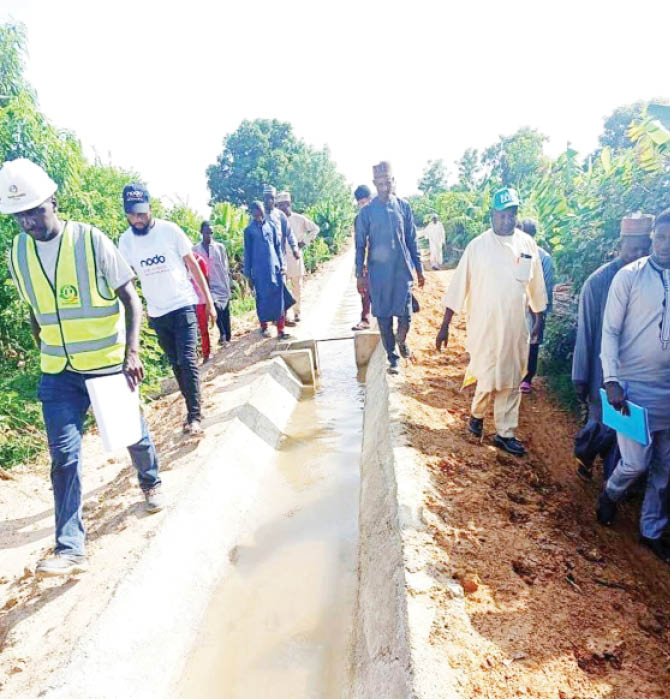How interventions in irrigation canal, access road heightened excitement in Kano agro communities
It was a celebration in 21 Kano agro communities that have so far benefitted from construction and rehabilitation of the access road leading to their market. This, the locals said had promoted agro commodity businesses in their areas. They also commended the construction/rehabilitation of tertiary irrigation canals for irrigation purposes, among other agro-driven interventions set […]

A section of the tertiary water canals constructed by K-Cares
It was a celebration in 21 Kano agro communities that have so far benefitted from construction and rehabilitation of the access road leading to their market.
This, the locals said had promoted agro commodity businesses in their areas.
They also commended the construction/rehabilitation of tertiary irrigation canals for irrigation purposes, among other agro-driven interventions set to promote agricultural and business activities in the rural communities of Kano State’s 44 local governments.
These agrarian communities are usually communities that have been cut up with the markets due to dilapidated access roads or absence of good access roads. It was reliably gathered that these communities have been finding it very difficult to convey their produce to the market, as well as commuting through the bad road.
- Coup: PDP warns FG on war with Niger
- Bayelsa gov’ship: Sylva will end cluelessness, oppression in governance – APC elders
“It is a jamboree for us in this village of Gabasawa as we no longer suffer to take our agricultural produce to the market. We are grateful to God for the intervention that came to us by the construction of this access road that linked our villages to the market, as well as allow for easy movement to other places. We have been suffering for years and our agricultural produce has no value to us because we will farm and find it very difficult to take our produce to where we can sell it,” said 30- year-old farmer, Malam Haladu Gabasawa.
The interventions were conducted and coordinated by the Kano COVID-19 Action Recovery and Economic Stimulus (KN-CARES), a World Bank assisted project in collaboration with the federal government of Nigeria and Kano State. It was revealed that no fewer than 50,000 small scale farmers from 484 communities in the 44 local government of the state are targeted to benefit from agricultural intervention under the Kano COVID-19 Action Recovery and Economic Stimulus (KN-CARES) project as a measure aimed at cushioning the aftermath of COVID-19 pandemic in the state.
Recent findings have shown that several kilometers of access roads have been renovated in various places within the project targeted areas for easy access to farms and markets to enable smaller farmers transport their products from farm to market.
The project had completed the renovation of roads at Gwarzo, Karaye and Rogo local government areas. The roads include Zango to Butawa in Gwarzo, Bariki to Yar Madaka, Unguwar Maye and Barkono Karshi in Rogo. Others are Kwanar Gaye to Taiki in Karaye Local Government respectively. It was also revealed that another 5km feeder road from Binoni village to Jigori village in Gabasawa Local Government Area of the state and others were being completely renovated.
According to a Binoni community member, Malam Usman Bello, the renovation of the access road has brought back life and wealth to their village. He explained that as a farming community, they can now take their produce directly from their farms to the market without hitches.
Similarly, the state coordinator of KN-CARES, Malam Rufa’i Halilu Ahmed, revealed that the project was aimed at expanding access to livelihood support and food security services, as well as grants for poor and vulnerable households and firms.
He explained that the 24-month project would continue to ensure an increase in food security and safe functioning of food supply chains for poor households. It also introduced 400 farmers to the newly adopted technology of the use of solar powered water pumps that needs neither fuel nor electricity to function in addition to fuel powered water pumps.
He stresses that the project would also support the objectives in protecting the very poor and vulnerable groups through expanding coverage of the existing social assistance interventions at the state level and enabling the delivery of basic social services to the people.
Several women and youths were also empowered under the project with poultry birds and ruminants for them to be able to start an agro-centred business.
It was, however, revealed that under the project over 1.5km irrigation canals were constructed in some local government areas to promote irrigation.
A beneficiary of the tertiary canal at Gwarzo, Shehu Idris, stated that the intervention brought to them had reduced the rural-urban migration trend in the area, adding that people in the area are now better off than they were 20 years ago.
